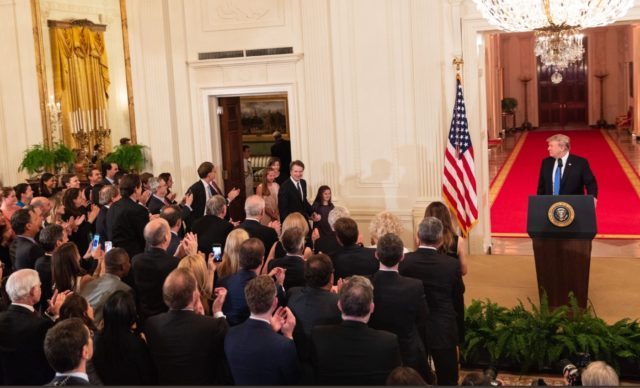Trump’s Supreme Court nominee Kavanaugh doesn’t believe a president can be criminally investigated
WASHINGTON – U.S. Appeals Court Judge Brett Kavanaugh, President Donald Trump’s nominee to replace retiring Justice Anthony Kennedy on the U.S. Supreme Court, has argued that presidents should be spared criminal investigations.
That position, expressed in a 2012 Minnesota Law Review article, could prove critical to the Trump administration, battling Special Counsel Robert S. Mueller III’s investigation into possible meddling in the 2016 presidential election.
“Criminal investigations targeted at or revolving around a President are inevitably politicized by both their supporters and critics,” wrote Kavanaugh, a longtime Washington insider who had served as a clerk to Kennedy, an aide to former President George W. Bush and a key investigator in the probe of former President Bill Clinton.
“The indictment and trial of a sitting President … would cripple the federal government, rendering it unable to function with credibility in either the international or domestic arenas,” Kavanaugh wrote. “Such an outcome would ill serve the public interest, especially in times of financial or national security crisis.”
Kavanaugh, the 53-year-old judge who has served 12 years on the U.S. Court of Appeals for the District of Columbia Circuit, wrote that even a president’s preparing for questioning in a criminal investigation would be “time-consuming and distracting.” He added that “criminal investigations take the President’s focus away from his or her responsibilities to the people. And a President who is concerned about an ongoing criminal investigation is almost inevitably going to do a worse job as President.”
The view expressed by Kavanaugh seems to indicate a shift from his work with former Independent Counsel Kenneth Starr, when the appeals court judge co-authored a report arguing that Clinton could be impeached obstruction of justice for lying under oath about the Monica Lewinsky affair.
Kavanaugh, who had been among the two finalists when Trump nominated Justice Neil Gorsuch to the high court, has generally, though not always, expressed conservative views in his opinions, and is widely viewed as an “originalist” and a “textualist” who interprets the Constitution as the Founding Fathers intended, in the mold of the late Supreme Court Justice Antonin Scalia.
Some conservatives have argued, however, that Kavanaugh has not been conservative enough on issues including abortion.
In Garza v. Hargan, he wrote an appeals court panel decision vacating a district court decision requiring the federal government to release a pregnant illegal immigrant teen in custody so she could have an abortion. The full circuit reversed the panel’s decision, but Kavanaugh dissented, calling the ruling a “constitutional principle as novel as it is wrong: a new right for unlawful immigrant minors in U.S. Government detention to obtain immediate abortion on demand.”
But Kavanaugh maintained the teen had a right to an abortion, and did not go as far as another dissenting appeals judge, who said the teen had no right to an abortion under the Constitution’s due process clause. (The U.S. Supreme Court vacated the D.C. Circuit’s ruling in Azar v. Garza, saying it’s moot because the teen had already had an abortion.)
Kavanaugh also has generally limited Obama-era environmental regulations and pushed back against expansion of the authority of administrative agencies.
Like Gorsuch, Kavanaugh, a Catholic, attended Georgetown Preparatory School in Washington and graduated from Yale in 1987 and Yale Law School in 1990.
This article is republished with permission from Talk Media News.

Gary Gately, a seasoned journalist, has won 15 national, regional and local awards for reporting and writing news, investigative, public service, feature, business and travel pieces. Gately’s work has been published by The New York Times, The Boston Globe, The Baltimore Sun (where he worked in reporting and editing jobs for 11 years), Baltimore Examiner, the Chicago Tribune, The Atlanta Journal-Constitution, The Guardian, The Washington Post, The Dallas Morning News, Business Week, Newsweek, Arrive Magazine, The Center for Public Integrity, CBSNews.com, CNBC.com, ABCNews.com, USAToday.com, HealthDay, The Crime Report, United Press International and numerous other newspapers, websites and magazines.
His coverage has received awards from the Associated Press, the Society of Professional Journalists, the Washington-Baltimore Newspaper Guild, the Maryland-Delaware-D.C. Press Association and the Society of American Travel Writers (first-place Lowell Thomas Award for best newspaper travel story/U.S.-Canada (immigrant New York).
Gately also has extensive experience editing for newspapers and websites, has taught college journalism courses in news writing, magazine writing and travel writing and is the author of Maryland: Anthem to Innovation, a book on the state’s history, industries and attractions.


So this SCOTUS doesn’t believe a president can be indicted. Does this choice really surprise anyone?